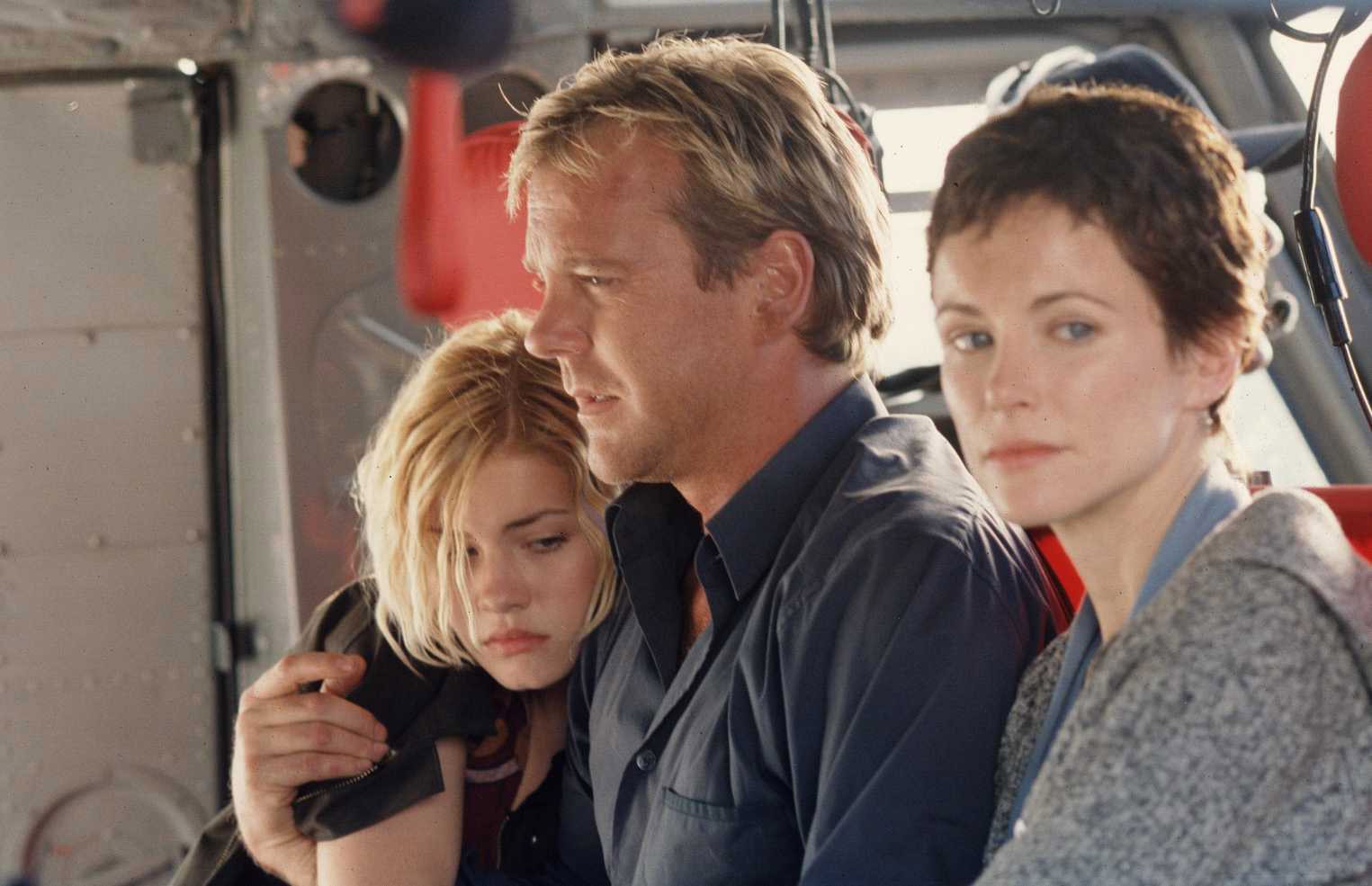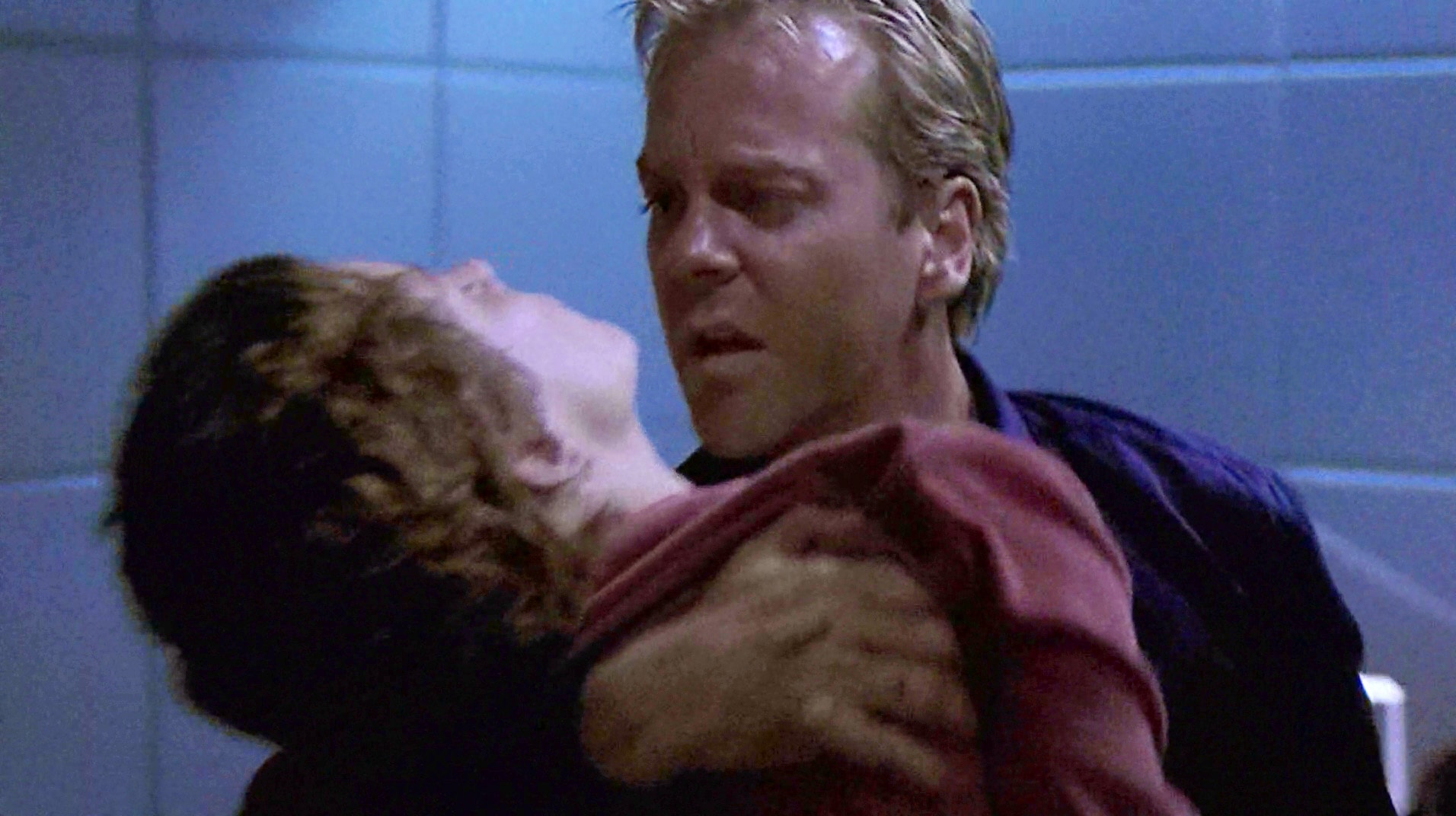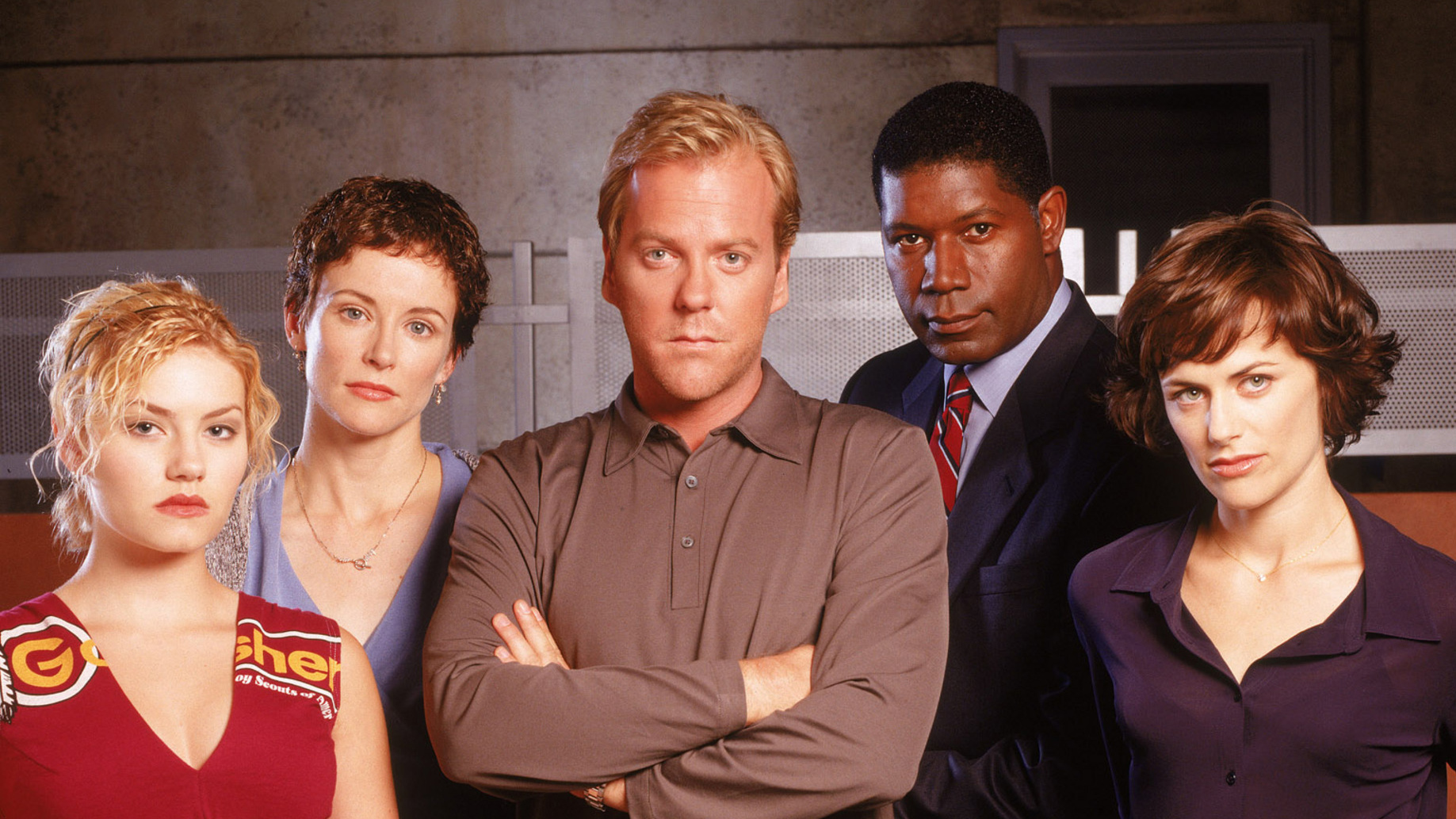The first season of 24 remains an insurmountable triumph. Every subsequent season has followed its example and lived in its shadow, iterating the original template with varying success but never quite recapturing lightning in a bottle. Some have come close, but the first season is still the most successful and the most significant. It still exudes innovation in a way that few other television shows have come close to matching.
A Recipe for Success
These are bold statements, but there are strong arguments to support them. Generally, the best seasons of 24 are those that feature a single threat and a strong narrative current from beginning to end. Having a solid frame in place and a clear direction for the story helps tie everything together, including the characters and themes. It allows for greater overall consistency and cohesiveness in the writing.
Conversely, the weakest seasons of 24 are generally those that feature multiple threats and shifting narrative currents. They move from one threat and one antagonist to another, sometimes with little connective tissue between them. This is not inherently an issue, but it can suggest that there is a lack of direction for the story as well as an absence of confidence in the writers. This can quickly lead to inconsistency and fragmentation in the writing.
The first season of 24 is an excellent example of this principle. The season is framed by the events of Operation Nightfall which spawns three closely interconnected plot threads; the assassination attempt on Senator David Palmer, the threat against federal agent Jack Bauer and his family, and the presence of a traitor in the Counter Terrorist Unit who is leaking classified intelligence to the terrorists.
The first season is relatively focused and tightly plotted, allowing it to move towards an endgame where the aforementioned threads dramatically converge. The ending was not planned in advance, but the final episode still feels like a natural culmination of everything that happened during the previous 23 hours. This is precisely because of the sharp and unwavering focus that the writers maintained throughout the season.
The season never once loses sight of these threads even when tangential subplots emerge. They are clearly introduced in the pilot and conclusively resolved in the finale. The murder scandal involving Keith Palmer that is brought to light and the amnesia that Teri Bauer experiences after believing her daughter is killed in a car explosion are often considered pointless filler at best, but they are still peripherally related to the assassination plot.
An Anthropomorphic Story
They also tell us more about the characters and the world they are living in. While the show has often been criticised for getting side-tracked by office politics and interpersonal conflicts, they are necessary elements for the show to work. They provide material that sustains the show for 24 hours as well as generate additional suspense and intrigue. They can be hit-and-miss but, without them, the show loses much of its substance and meaning.
The characters and their relationships take centre stage in the first season of 24. This means that the characters drive the plot rather than the other way around, providing more intimacy without sacrificing intensity. It is also the only season of the show where the threats are levied exclusively against a handful of distinct individuals as opposed to a group of faceless people. The calculus of war that dominates later seasons is almost entirely absent here.
The anthropomorphic nature of the first season imbues the story with greater authenticity. The stakes are not as high; but they feel more personal. The scale of the threat is smaller, but it has a more significant impact on the characters. The pacing is slower, but the passage of time has a more noticeable effect on the characters. Action set pieces are smaller, but seem realistic and resonate more strongly. Less people die, but each death feels significant.
Even the real-time element of the show is more closely adhered to during the first season. Later seasons saw the threats increase in magnitude and the plotting become denser, necessitating the reduction of excessive travel time. Characters started covering large distances in impossibly short timespans. The real-time constraints were ignored for the sake of convenience and to let characters reach their destination as quickly as the plot required.
This commitment to real-time and character-centric stories is what elevates the first season and makes it feel like a genuine 24-hour day. Arguably, the first thirteen episodes of the season are the strongest and most consistent in the show’s entire run. From the moment Richard Walsh is gunned down outside Dunlop Plaza to the rescue operation Jack single-handedly carries out to save his family from Ira Gaines, 24 makes an indelible mark on television.
Searching for Direction
Those who are familiar with the production of 24 will know that only the first thirteen episodes were originally ordered by Fox. As the first season of a brand new show in uncertain times, there was never any guarantee that 24 would take off. As a result, the writers were forced to conclude many of the story arcs by the end of the thirteenth episode. The assassination plot is foiled, the Bauer family is saved, and the traitor at CTU is revealed.
 Episode 13 was designed to work as a series finale in case the show wasn’t picked up for a full season
Episode 13 was designed to work as a series finale in case the show wasn’t picked up for a full seasonWhen the show was picked up for a full season, these story arcs had to be jump-started to fuel the remaining eleven episodes. A new shooter is introduced to continue the assassination plot, the Bauer family is targeted again, and a second mole at CTU emerges. This is a tad clumsy, but a necessary evil that allows the season to retain its original plot threads without performing a 180 degree turn and moving on to something completely unrelated.
Indeed, the events of Operation Nightfall continue to frame the story. The surviving members of the Drazen family dispense of the intermediaries and take direct control of the operation, pushing ahead with their plan to exact revenge against Palmer and Bauer for the ostensible murder of their father, Victor Drazen, two years earlier. This leads to the revelation that Victor survived and has since been incarcerated in a top secret prison.
Even so, the second half of the season initially struggles to find its footing. The afternoon hours are marred by melodramatic plot twists and a lack of momentum. Teri suffers from amnesia in one of the most derided sub-plots of the series, Kim is caught in the middle of a drug bust that exacerbates her tendency to find trouble, and Jack stumbles around looking for new leads that includes contending with Palmer’s goddaughter who has been sleeping with Alexis Drazen.
These aren’t inherently terrible plot twists, but they are indicative of a season that is meandering forward in search of direction again. The show has to find ways to fill out 24 episodes, keep the Bauer family relevant, and give Jack something to do in the meantime. Consequently, it manufactures sillier and more contrived ways to do so. Fortunately, these detours are temporary and the payoff is ultimately worth it.
The Personal Cost
Thematically, season one is about the struggle to separate personal lives from the gruelling demands of politics and field work. Numerous characters are compromised at some point as a result of their personal relationships interfering with their professional responsibilities. Jack and his family are affected by the events of Operation Nightfall while David Palmer’s attempt to win the democratic nomination is affected by a murder scandal involving his son.
These are the two most obvious examples, but they can also be identified elsewhere. Tony Almeida’s objectivity is affected by his feelings for Nina, Jamey Farrell becomes a traitor to financially support her family, and Elizabeth Nash engages in an illicit relationship with a man who intends to assassinate Palmer. Even Scott Baylor, who uncovers the presence of a mole in CTU, initially refuses to offer assistance after placing his family in jeopardy.
These complications tend to have disastrous consequences for the characters. Jamey is murdered by Nina to stop her from interfering with the assassination plot, Elizabeth fatally stabs Alexis in a moment of blind rage, David and Sherry’s marriage is irreparably damaged as a result of the latter’s deception, and Jack’s family is forever fractured when his wife is murdered by Nina – his former lover and most trusted confidante.
The Blueprint for the Series
Structurally, season one serves as the first entry in the first trilogy of the series. It introduces multiple ideas that continue to develop in season two before being resolved in season three. This includes the fallout of Operation Nightfall, the first presidential term of David Palmer, the rise and fall of Tony Almeida, the treachery of Nina Myers and Sherry Palmer, the transition into adulthood for Kim Bauer, and the short-term impact of Teri Bauer’s death.
Season one also establishes the blueprint for the rest of the series. Specifically, it introduces the character of Jack Bauer whose journey rapidly becomes an inextricable part of its DNA. The story begins with his humanity untarnished. His family life is imperfect but relatively normal and full of possibility. He has yet to experience the crushing losses and defeats that disconnect him from the world. This season will set him on a path from which he can never turn back.
The death of Richard Walsh in just the second hour is the first of many that Jack will endure throughout the series. A great deal of history between the two characters is implied, but there is little opportunity to explore it in further detail. Walsh appears in just two episodes, but his death has a profound effect on Jack. For the audience, it arguably has even more gravitas than the death of longer-running characters like Edgar Stiles.
In the fourth episode, Jack teams up with police officer Jessie Hampton while chasing a suspect. She is taken hostage by the suspect and killed, leaving Jack visibly distraught. This is a notable reaction given his willingness to sacrifice innocent lives to achieve a greater good in later seasons. At this very early point in the series, Jack is a man whose focus is on saving individual lives. The ‘big picture’ focus that later dominates his thinking is yet to emerge.
Jack is a more human character in the first season. He is more responsive to the terrible things that happen around him and he shows signs of physical and emotional exhaustion. There is even a moment when he starts to fall asleep while hiding from the authorities. He is not yet capable of the superhuman feats he becomes famous for, including killing dozens of people in a matter of hours or withstanding injuries that would incapacitate others.
A Cautionary Tale
In broad strokes, the trajectory of the series is telegraphed as early as the first episode. In a conversation with Nina, Jack warns about the dangers of compromise and how it can subvert even the most well-meaning people. He argues that doing so for the sake of expediency and self-interest can set a dangerous precedent, making it easier to compromise in the future until it becomes a normal and acceptable method of conduct.
The implications of this conversation are not immediately perceptible, but it becomes clear that this is the thematic linchpin that binds the entire series together. 24 is a cautionary tale about how compromise invariably leads to corruption. The downfall of Charles Logan, Alison Taylor, Tony Almeida and many more can be traced back to an initial decision that involved a compromise to achieve selfish or expedient outcomes.
Even Jack is not immune to its corruptive influence. He frequently tortures suspects for information that they are otherwise unwilling to share. He also disregards laws and protocols that obstruct his investigation. This has a cumulative effect which, in combination with the personal sacrifices he is forced to make, isolates him from the world and prevents him from leading a normal life.
Transcending its Origins
Season one enters its final hour with the revelation that Nina Myers is the second traitor in CTU; that she has been feeding the Drazen family information about Jack and Palmer the entire time. It is one of the greatest twists in the history of the series and secures her place as one of its most memorable villains. The show tries to repeat this twist in later seasons with only a fraction of the same success. No other attempt has been as shocking or as raw.
24 quickly developed a reputation for unpredictable storytelling and high-octane action, but these were to be expected from a show about assassination plots and acts of terrorism. Moles and traitors fall within the parameters of that premise. The identity of the mole might have been surprising, but the mere fact that a mole existed in the first place should not be. Mechanically, the show did exactly what was expected of it.
Sometimes, however, a story will exceed its parameters and transcend its origins. LOST is a fantastic example of this. At the end of the fourth episode, John Locke is revealed to have been in a wheelchair before crashing on the island and somehow regaining the use of his legs. A combination of excellent writing, acting, directing, and scoring create a powerful moment that shapes the future of the series in ways that were previously unthinkable.
This represents the defining moment LOST turned into something other than a 21st century version of Gilligan’s Island. Instead, the show starts drawing from an amalgamation of philosophical and mythological ideas to tell a story about a group of deeply flawed people who are trying to find themselves. They are connected in ways they cannot imagine, surrounded by incomprehensible forces, and called upon to take part in events far greater than themselves.

The death of Teri Bauer is the defining moment of 24, influencing and informing every aspect of the series going forward. The horrifying nature of the series suddenly reveals itself; people will die, tragedy is unavoidable, every victory will come with a price, and there will be no happy ending. The show transcends its origins to tell a story that is about more than simply thwarting terrorist attacks and uncovering conspiracies.
Jack suffers a gut-wrenching loss from which he will never recover, setting him on an inexorable path of loss and isolation. The next eight seasons will continue to strip away nearly every piece of his humanity until little remains. The journey began here, at the end of the longest day of his life, with the death of his wife. It seals the first season of 24 as a masterpiece as well as one of the greatest seasons of television ever made.
About the Author
Bradley Hinds is a professional copywriter and 24 enthusiast. He has a passion for various storytelling mediums, an unhealthy obsession with Pink Floyd, and enjoys writing accessible long-form analysis when he isn’t spending half the day playing a Mass Effect game.




49 Comments
Comments ClosedAcer4666
May 14, 2017 at 5:08 pmCouldn’t agree more. The first season has always been a country mile ahead, in my opinion.
X
May 14, 2017 at 6:29 pmThey killed innocent people (Drazen’s wife and children) through their governmental duties (a government that doesn’t care about them).
The Drazens are justified in their vengeance for their innocent loved ones.
And they succeed by tearing both Jack and David’s families apart (specifically Jack’s).
The sins of Jack (Operation Nightfall and his love affair with his coworker) came back around to kill his wife.
This is a wonderful and frightening parallel to the reasons for terrorists carrying out the events on 9/11.
America invades other people’s lives for profit, disregarding innocent casualties.
No side is innocent, but America (Bauer/Palmer) did draw first blood and any payback can be justified for those casualties (in the senselessness of war).
24 is practically screaming reality in the faces of viewers, yet most continue to ignore that reality.
It’s nice timing on 24’s part.
Brad
May 14, 2017 at 6:51 pmJack Power
May 14, 2017 at 7:34 pmAnd I have a question for you: If you could prevent Abu Fayed from detonating a nuclear bomb by killing him and his family by an air strike before day six, Would you rather do it or do you prefer that more than 12,000 Americans will day from the nuclear bomb?
Also in season 8 the president of Russia was responsibale for putting a nuclear bomb in New York and almost detonating it. He did an act of war that can start a WW3 and America almost didn’t do anything against russia after day 8. If it would happened in real life I think that America would have done severe things against Russia and it will probably open a war between America to Russia.
Brad
May 14, 2017 at 7:37 pmX
May 15, 2017 at 1:23 amThough, I do put blame on the American Government for this one.
They don’t care about right/wrong, only profit.
The Drazens were likely terrorists because of the wrongs the American government did to their friends/people.
WAYNE KING
May 15, 2017 at 8:20 pmXAM
May 15, 2017 at 10:01 pmBasically X is right.
Nitromancer
May 15, 2017 at 11:11 pmGerry Mander
May 16, 2017 at 3:58 amThat’s the facts of the matter… here endeth the lesson.
XAM
May 17, 2017 at 8:21 pmThey can all make peace and dance around in flowery necklaces, or they can all kill each other, I’m really not fucked either way.
X
May 15, 2017 at 1:46 amI just care about life/lives.
American individuals can be just as stupid as any other country’s individuals or just as intelligent.
I hate nationalism.
I hate religion.
Those are all things that are meant to separate and create war.
I think an air strike is a pussy tactic.
It just screams, “I don’t care what innocent lives are lost as long as I absolutely destroy my target”
A target that was probably wronged by other air strikes killing their families and destroying their lives.
Just realize that you will have killed other people’s families in that air strike and you will create even more enemies who will be justified in their actions that will take more lives, innocent lives.
The problem is what’s being taught and propagandized by governments (news).
If they would stop treating people as mindless cattle to be herded (not that I think cows are mindless)…
The government perpetuates lies and religion to keep people stupid.
My solution in your proposal is to figure out who Abu Fayed is and why he’s doing what he’s doing (what does he want).
Find a solution to help him if his base intentions are good.
Though the reality is that you/we/our government is the enemy that ruined his life.
If he’s a monster, take him out with precision.
Killing innocent people just to kill one guy (who is likely a part of a bigger ideology) only creates more like him and makes him/them a martyr where their power grows stronger.
There’s a reason Christianity (and nearly every religion) uses the sympathetic messiah myth where some poor powerful hero died for you in order to garner your blind allegiance to their evil cause.
Government is never about helping people or stopping “bad” people.
Its strictly profit for their people/themselves.
They only eliminate those that get in their way of greed.
The government would have saved North Korea from its evil rulers by now if it was about morality.
Gerry Mander
May 15, 2017 at 7:33 amI don’t know you, but you sound like an angry and troubled person who uses external issues to vent inner anger and frustrations in your own life… either that or stop reading/watching kooky left-wing propaganda (as you evidently are), it’s doing you a disservice on several different levels and making you look foolish.
Just my own humble opinion,
Gerry Mander
May 15, 2017 at 7:43 amI still rank Day 5 as the best season though… Day 1 wobbled (a bit) in the latter half, 5 was near perfect from beginning to end.
Brad
May 15, 2017 at 7:50 amMarlon
May 14, 2017 at 7:37 pmNice article and comment
Cheers
Chlojack
May 14, 2017 at 11:22 pmPaul
May 15, 2017 at 8:19 amA very well thought out kidnapping plot by the writers, the plot twist of Alan York really being Kevin Caroll, was very clever. David Palmer the greatest President on the show.
XAM
May 15, 2017 at 10:03 pm24 Spoilers
May 15, 2017 at 11:43 pmThe smaller scale and slower pace really worked in its favor. The second episode in Dunlop Plaza for example had so much tension and suspense out of such a simple idea. Jack stealthing around the dark empty building and searching every nook and cranny for the gunmen (and Walsh) with the music and camera angles always making it feel like danger could be just around the corner. Then the tense shootout in the office room where Jack couldn’t actually see the gunman but had to instead listen for the sounds of his footsteps over shards of broken glass. That to me is a way cooler scenario than Jack simply kicking down a warehouse door and murdering a dozen baddies like he would in later seasons.
And then after Walsh is gunned down by the sniper and Jack escapes into his SUV, it switches to a first person view that makes it feel like you’re right inside the vehicle with Jack speeding through all the red lights. The entire first season just had tons of small touches like that which made it feel more immersive than any other. Every time I rewatch the first season I find new things to appreciate about it.
Brad
May 16, 2017 at 12:10 amThe Predictor
May 16, 2017 at 8:55 amBrad
May 16, 2017 at 9:50 amX
May 16, 2017 at 9:25 amNina and Tony were both kept open to being the mole and they landed on Nina for the dramatic effect it would have.
Remember hour 2 and the reveal of the mole’s name on the keycard.
Walsh told Jack that the mole’s name would be revealed on it and there it was.
A summary of what Howard Gordon explained:
“- Early in the series, when Jack’s boss gives him a keycard and tells him that it belongs to the dirty agent, Nina appears to have been exonerated because she was able to show Jack that on the day she’d supposedly last used it, she and he had been together in Santa Barbara. “In fact, she altered the date on the keycard to cover her tracks,” according to the document.
– The dead shooter’s thumb (cut off by Jack in one of the show’s grislier scenes) yielded no ID because “Nina erased the record from the database.
– While Nina was responsible for tipping Jack’s wife, Teri (Leslie Hope), that the man she was riding with wasn’t who he said he was, it’s because Nina hadn’t been told about the other plan to assassinate Palmer or the man’s involvement.
– The leader of the other plan didn’t know about Nina, either, which is why he ordered Jack to shoot her.
– When Nina helped catch Jamey, it was to deflect attention from herself.
– When Alexis Drazen was stabbed, she didn’t tell his brother because “telling the Drazens…does not further her objective, which is to ensure that Palmer is assassinated by the end of the day.”
– Though she tips the Drazens off to Kim’s location, she doesn’t kill Kim or her mother when she has the chance because her objective “is Palmer’s assassination and not the death of Jack’s family members.””
Brad
May 16, 2017 at 9:48 amX
May 16, 2017 at 10:19 amA lot of people make that show and they all have their own version they want to tell.
Secrets and ideas were surely kept from others.
From what I know, Nina and Tony were both kept open to be the mole in CTU from the beginning and they would decide which one was it when the time came.
The Predictor
May 16, 2017 at 12:26 pmX
May 16, 2017 at 9:08 pmWhen she called them at the end, you can tell they haven’t spoken for a long time (way before that day).
Nina had her orders that had nothing to do with the Drazens.
Nina was supposed to stay embedded within CTU.
Nina only followed orders.
She genuinely cared for Tony, Jack, and his family, but her orders/mission took precedence over anything, even her feelings.
She only worked with the Drazens at the end because Jack was going to find out about her and she couldn’t let that happen.
Just like when she tied up Teri and meant no harm to her, once she got the order to eliminate any ties of anything that could connect her to Germany, she regrettably had to kill Teri because Teri overheard the conversation.
It was nothing personal.
That’s just her fucked up way of reasoning and chosen life.
Once she knew Jack was going to find out about her and blow her cover, all bets were off and she made that call.
Then when Jack survived that ordeal, she knew her CTU cover was over and she had to flee because Jack was coming with a vengeance.
Brad
May 16, 2017 at 9:12 pmX
May 16, 2017 at 9:52 pmSo I guess that would be merciful to you.
No killing is merciful.
You could definitely interpret that as an added ‘fuck you’ to Jack.
Or you could see it as a hopeful way of keeping Teri alive or alive long enough to say goodbye to a loved one.
From what I understand, gut shots are very painful but it takes long to die.
That way, someone could find her and save her while Nina can tell her employer that she did shoot the woman that could link her.
Been a long time since I’ve seen Day 1, but I do remember it well enough.
I don’t remember if Teri revealed to Nina that she was pregnant.
I remember a deleted/extended scene showing this exchange, but I can’t remember if that was an alternate take or if it meant they cut out the fact that Nina knew she was pregnant.
May have even exclusively been in the extended cut found on the special edition DVD (and the UK broadcast).
Interpret it however you want (which is the point of the way she killed her).
But I think its safe to say that Nina had no intention of killing Teri until she was ordered to.
Brad
May 16, 2017 at 9:56 pmX
May 16, 2017 at 10:13 pmX
May 16, 2017 at 10:29 pmIt’s possible you’re remembering that and Nina never knew in the original version.
I recall that scene because I originally watched the episode from the UK version which had extended scenes compared to the U.S. televised version. If I remember correctly.
Just pointing out that there could be two versions and two interpretations of Nina shooting Teri in the stomach.
Either a “I’ll give you a chance to survive this” gut shot (having no idea she’s pregnant) or a “fuck you and your family, Jack, for choosing her over me”.
Brad
May 16, 2017 at 10:37 pmTrevor
June 4, 2017 at 4:27 pmUK viewers will also see this as a regular scene of the show as it was in the original airing on BBC (and on the Region 2 DVD set)
Trevor
June 4, 2017 at 4:30 pmX
June 23, 2017 at 8:56 pmIn the episodes I downloaded from online, (in season one) the only extended episode is the last one, the last one which was originally in its extended form for the UK. So the downloaded episodes match the UK broadcast versions.
The Teri telling Nina she’s pregnant scene is in episode 1x23. So that scene, in the extended version, is only on the Special Edition DVD and nowhere else.
In the extended version of 1x24 (which is the more widely available version), Teri does tell Nina that she can tell Nina still has feelings for Jack and her and Jack are getting back together and going to have a baby. She says it casually like they plan on having a baby. Nina doesn’t seem to care because she’s trying to get Teri out of there at that moment (because Germany is calling on the ringing phone). But Nina does hear her say they are going to have a baby (almost as an absent-minded slip, not that its supposed to be a secret. This scene was right after she called Jack, for the last time, to tell him she’s pregnant).
What’s canon depends on what version of 24 you decide to follow when you view the series:
– The original UK version (which doesn’t have the Nina telling Teri she’s pregnant bit but does have her casually mentioning that she and Jack are going to have a baby).
– The original US version (where Nina never finds out Teri is pregnant in any way, unless you want to interpret the gut shot as her having eavesdropped on Teri and Jack’s last conversation. Otherwise you may merely think the gut shot was coincidence and irony). This would mean that the gut shot was not personal (in the twisted reality Nina lives in) and Nina is telling the truth in Day 2 when she tells Jack it was nothing personal.
– The Extended episodes version (where Nina absolutely knows that Teri is pregnant because Teri rubbed it in her face). This makes Teri’s killing quite personal or at least the method in which she dispatched her.
For me, if I remember correctly, I saw the UK version originally and the gut shot was sort of ominous. Like maybe she caught that little bit where Teri said they were going to have a baby and took it personal. But the way Teri mentions it (in this version), it could mean they plan on having a baby after they get back together and not that she’s pregnant at the moment.
When I saw the deleted scene from 1x23 (Teri tells Nina about her pregnancy) on the DVD (later on), it really stuck in my mind and is impossible to forget (even though its supposed to be a deleted scene) because the consequences and weight of that moment between those two characters is a heavy combination of their past, present, and future (because we already know what Nina’s going to do to Teri later).
X
May 16, 2017 at 10:29 pmMilo
May 20, 2017 at 4:51 amRonnieC6
May 18, 2017 at 1:13 pmBut I don’t nitpick, analyze or get disappointed. I just sit back, watch, and enjoy.
Brad
May 18, 2017 at 7:13 pmRonnieC6
May 19, 2017 at 2:30 pmBut as a viewer, I find more enjoyment comes with less analysis.
David
May 30, 2017 at 4:20 pmBrad
May 31, 2017 at 5:28 amA
June 17, 2017 at 6:50 pmBrad
June 19, 2017 at 6:47 amBarbara Johnson
June 18, 2017 at 9:39 pmBarbara Johnson
June 18, 2017 at 9:40 pmThe True Form
December 29, 2017 at 1:49 pmRichard Walsh’s death is something not many people talk about, but in the 7 or 8 rewatches I’ve done on 24 Season 1 since 2001, I have noticed that Jack is hurt greatly. When Jack speeds away from Dunlop plaza, tears in the eyes, running through traffic lights, Callery’s soundtrack blazing perfectly–and the camera pans up to reveal Los Angeles at night, it is perfection. We know in hardly any words, that Walsh’s death will change everything–and it does. Jack has huge shoes to fill, all the time knowing there is a leak at CTU.
Teri’s amnesia is easily explainable and totally understandable. The woman goes through the single worst day of her life and loses her life in that same day. The day starts at midnight, she had an argument with her daughter earlier in the day, she’s about to go to bed and enjoy some rest with Jack at her side, her daughter then runs away, Jack gets called into work late, she searches for her daughter all night with this ‘Alan York’, gets a phone call from her daughter who is frantic, gets kidnapped herself, gets raped, finds out Alan York isn’t really Alan York, finds out she’s pregnant, finds out Nina has been banging Jack while they were separated, finds out Nina speaks German and works at “Frankfurt Division”, and then gets killed by Nina.
Talk about the single worst day anyone could ever have–as a result, Teri’s amnesia is COMPLETELY and TOTALLY acceptable and understandable, any mother out there enduring that same day would also find themselves in a similar predicament.
The safe house miniseries was also absolutely fantastic. Nina conducts interviews and you can see the wear and tear on all the characters–people are TIRED. They have been up since midnight–and the entire day before that. Nina leaving the safe house JUST BEFORE IT IS ATTACKED is absolutely brilliant, because it places that little cookie in the mind where you indirectly realize, woah–NINA was informed by Drazen to get away from the Safe House, because they were about to attack it. AWESOME, and brilliant writing. Not many people are aware that Nina literally got away seconds before.
The only weakness, and let me repeat–the only weakness of 24 Season 1 is the constant mentioning of “Dr. Farragamo”. Not only is the name absolutely hilarious, but it’s mentioned in EVERY SINGLE EPISODE after he is first brought up, until a certain point and his storyline ends. But to the new viewer–who the HELLO is Dr. Farragamo and why is he ALWAYS brought up. That is the only weakness of 24 Season 1, writers could have found a way to not have Dr. Farragamo always mentioned and maybe put in a little plot line of his own–and perhaps a name change to something better for a new audience that starts the show after Dr. Farragamo is introduced. We only see the character for a total of 5 seconds, yet he is mentioned in nearly every episode.
24 Season 1 – 10 out of 10. The greatest Season of 24, the greatest characters in 24, and the best twists of 24 period.